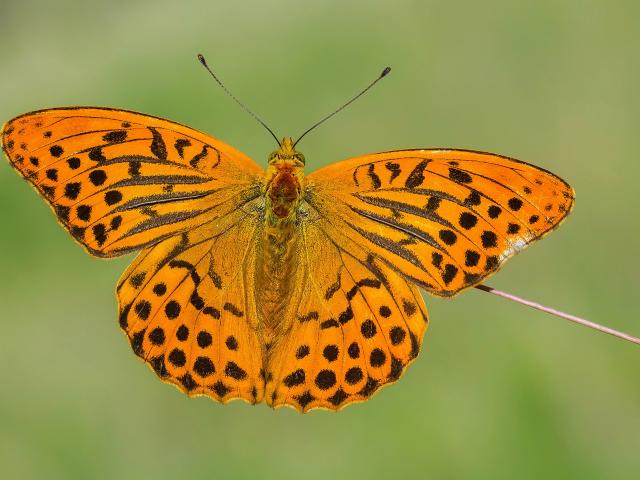Sir David Attenborough is urging people to take action for butterflies and moths this year, to mark the 50th anniversary of wildlife charity Butterfly Conservation (BC).
More than three-quarters of the UK’s butterflies and two-thirds of our larger moths have declined in the last 40 years.
BC President Sir David, said: “Half a century ago a small group of naturalists became so concerned about the plight of the UK’s butterflies that they decided to join forces to protect them.
“That organisation became Butterfly Conservation and 50 years later the need for people who care about our butterflies and moths is greater than ever before.
“The fortunes of the UK’s butterflies have ebbed and flowed over this period. Sadly many species have struggled as their habitats have shrunk and climate change and pesticide use have taken their toll.
“But throughout these troubled times Butterfly Conservation has always been there standing up for butterflies and moths.
“Thanks to Butterfly Conservation a huge number of us now care about butterflies and are aware of their plight and what’s more, we now know how to protect many species and reverse their declines, providing them with a home for the future in the countryside as well as our back gardens.”
BC has 31 Branches around the UK, with many taking part in a National Conservation Day of Action on Saturday 10 March. The charity will be celebrating its landmark birthday over this weekend, where it’s hoped a record number of people will attend a Branch event or carry out practical work in their gardens to help their local butterfly and moth species.
There are also plenty of opportunities throughout the year to get involved in Branch events, either on a guided butterfly walk, a conservation work party or to take part in a survey.
Find an event near you
BC was founded in March 1968 and is now one of the largest insect conservation organisations in the world.
The charity runs projects to protect more than 100 threatened species, as well as conserving hundreds of sites and reserves across the country.
BC’s Director of Conservation Science, Dr Nigel Bourn, said: “Whether you help manage a meadow or can do some work in your own garden, please join in the effort this year to celebrate 50 years of saving butterflies and moths."
BC Successes

- Recording – we run three of the world’s largest butterfly and moth recording schemes which together have gathered more than 60 million records.
- Revealing - our butterfly and moth atlases and ‘State of’ butterfly and moth reports have revealed the extent of species declines and where conservation effort should be focussed to help species recover.
- Working – we have delivered conservation projects across more than 90 key landscapes.
- Conserving – our reserves have saved 700 hectares of habitat for butterflies and moths, providing valuable places for people and wildlife.
- Restoring – we played a key role in reintroducing the UK’s rarest butterfly – the Large Blue after it became extinct. Working in partnership with conservation professionals and agencies the butterfly is continuing to thrive.
- Rebuilding – our Landscape-scale conservation report revealed how to tackle butterfly and moth declines by linking habitats across the countryside.
- Collaborating – We are partners in the most ground-breaking conservation project in the UK’s history - Back from the Brink will save 20 species from extinction and protect a further 200 threatened species.
- Advocating – we have persuaded Government to accept butterflies and moths as official biodiversity indicators. Our data has informed and influenced environmental and agricultural policy.
- Educating – our education campaign Munching Caterpillars has reached more than 18,000 children and is empowering and engaging the next generation to care about butterflies, moths and our environment.
- Communicating – we have successfully raised public awareness of the plight of butterflies and moths by talking to more than 100,000 people every day through our social media channels like Twitter and Facebook.
- Inspiring – we are the largest insect conservation organisation in the world with more than 140,000 supporters. As founder members of Butterfly Conservation Europe we have supported and inspired the conservation of butterflies and moths across the Continent.
- Engaging – more than 250,000 people have taken part in our Big Butterfly Count – the largest insect citizen science project in the world.
- Volunteering – More than 15,000 volunteers from our 31 regional Branches, plus other supporters who give up their time for free, carry out work worth £10 million per year.
Would you like to support Butterfly Conservation? Find out How.


